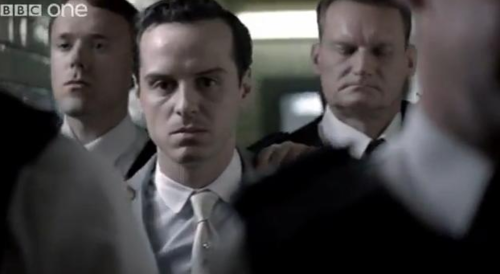 |
| Benedict Cumberbatch as Sherlock Holmes |
These trials took place only a few years after the trial of OJ Simpson for murder in 1995, a trial that was in its time widely claimed to be the trial of the century – albeit a different century. Indeed, it is possible to find the claim being made about large numbers of trials going back to the early years of the twentieth century. Other candidates for the ‘trial of the century’ include variously the trial of Julius and Ethel Rosenberg (1951), the Nuremberg trials (1945), the Scopes ‘Monkey’ trial (1925), the trial of Leopold and Loeb (1924), and the trial of Harry Thaw (1906) – and large numbers of trials in between. That we cannot know which criminal trial was ‘the’ trial of this, or any other century, has not hindered the rush to label trials in this fashion.
It is easy to make fun of this, and in a way that is precisely what Sherlock was doing. However, beyond the attempt to build up the profile or significance of the event, to attract viewers or readers, it does raise some more serious underlying issues. Why do we use this tag so often? Why is it that ‘trials of the century’ seem to be occurring ever more frequently? And is there something about this – or the last – century that accords special significance to criminal trials?
 |
| Moriarty on trial |
One answer might be that trials matter because they are always about more than the particular case, that they reveal something about the time and culture in which they take place. Trials, from the 'trials' of Socrates or Jesus onwards, have always seemed to offer access to a deeper understanding of the society within which they take place. They have been moments of confrontation between established power and the citizen, or between individuals, that have the potential to throw new light on social or political relations or reveal something hidden beneath the surface of conventional social interaction. This is partly a result of legal procedures, particularly in common law systems, where trials take the form of a publicly staged contest, but it is also because trials have in a way been designed to do just this. The staging of the trial, from the language used to the legal rituals to the symbols of justice and the architecture of the courtroom, seeks to represent the law in a certain way, to legitimize the exercise of state power and present a certain image of the community of law. Thus a trial might be dubbed a trial of its century because it crystallized a particular kind of social conflict or dispute, because it laid down the template for succeeding trials, or because it symbolized something particular about the age. But there is arguably something more at stake when contemporaries describe the trials of their own time in this way, for going beyond the simple hyperbole of the claim, it requires a certain amount of self-consciousness, the belief that this trial is capable of revealing a truth about our society and our time. In these terms, the significancce of the claim may be less that any given trial is really the trial of the century, than that our age is the century of the trial. by this I mean that trials have become invested with a particular kind of significance as we expect them always to be about something more than just themselves.
No comments:
Post a Comment